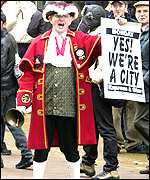City Status
What is British City Status?
City Status is a rare honour granted by the monarch on the advice of the Government by letters patent (an open letter, not a charter) normally on special royal occasions. There is no set criteria as in other countries.
The government recently invited towns, through their local councils, to apply for city status in a competition to create a new city to celebrate the Queen's Diamond Jubilee in 2012. 25 Towns have applied (see Table 3 below) and the three winners announced on 14 March were Perth in Scotland, Chelmsford in England and St. Asaph in Wales.
Does a town need a cathedral to become a city?
 NO. All UK towns (through their local council) can apply
to become a city, whether they have an Anglican cathedral or not. There are 18 cities without a cathedral and
13 towns which have an Anglican
cathedral but do not have city status. See the tables in the Cathedrals
section for the complete lists.
NO. All UK towns (through their local council) can apply
to become a city, whether they have an Anglican cathedral or not. There are 18 cities without a cathedral and
13 towns which have an Anglican
cathedral but do not have city status. See the tables in the Cathedrals
section for the complete lists.
Henry VIII created 6 cathedral towns in the 1540's and gave them all city status by letters patent. This created the association between having a cathedral and city status and the other towns with cathedrals at the time also became to be considered cities since "time immemorial".
The government in the 1880's tried to maintain the link,
when new cathedrals were founded in Liverpool, Wakefield and
Newcastle, by giving all three towns city status soon after. This became
increasingly more difficult to do when the small village of Southwell got
a Cathedral in 1884 and big cities like Birmingham and Belfast without
cathedrals were still waiting for city status. In the end government
finally broke the link between cathedrals and cities when they decided
Belfast and Birmingham could become cities without cathedrals and
Southwell would remain a town. Both Birmingham and Belfast eventually did
get Anglican cathedrals some years after gaining city status.
Which towns in the United Kingdom have city status?
There are 69 Cities in the UK. There are 51 cities in England, 7 in Scotland, 6 in Wales and 5 in Northern Ireland. The complete list of UK Cities in alphabetical order can be found in Table 1 below.
Can a Town lose its City Status?
If a city council is lost in local government re-organisation then so is that town's city status (unless the monarch decides to restore it on application by the former city).
Rochester lost city status in 1998 when it became part of Medway Borough with Gillingham, and Hereford lost it in 2000 when it became Hereford Parish within the County of Herefordshire.
Hereford re-applied in 2000 and was successful. Rochester has never re-applied and is the only town in civic history to have lost and not recovered it's city status.
Does every British City automatically have a Lord Mayor?
NO. The honour is not automatic and every city has to apply for it. There are 31 Lord Mayors (Lord Provosts in Scotland) but 69 cities in the UK. See the table in the Lord Mayors section for the complete list. 12 Cities applied for the honour to celebrate the Queen's Diamond Jubilee in 2012 and the winner was Armagh in Northern Ireland.
Recommended Reading
City
Status in the British Isles, 1830–2002 by John Beckett
City Status Tables
Table 1 - UK Towns with City Status
Table 2 - Largest UK Towns Without City Status
Table 3 - Towns that have recently applied for City Status